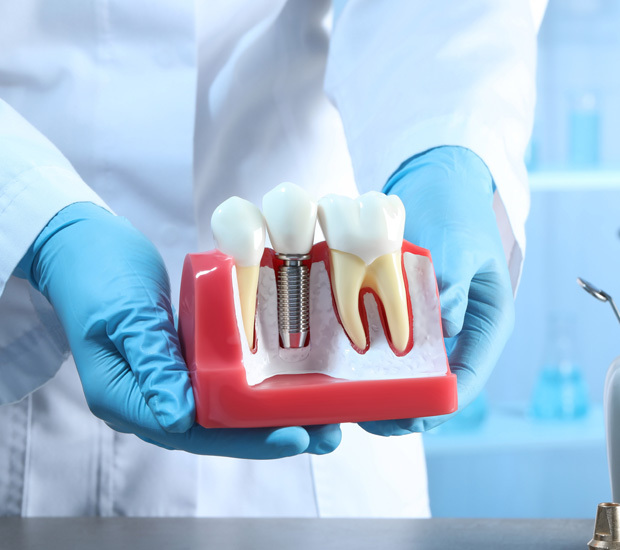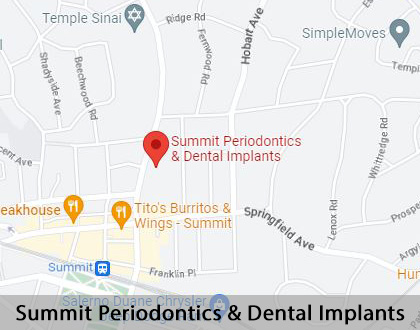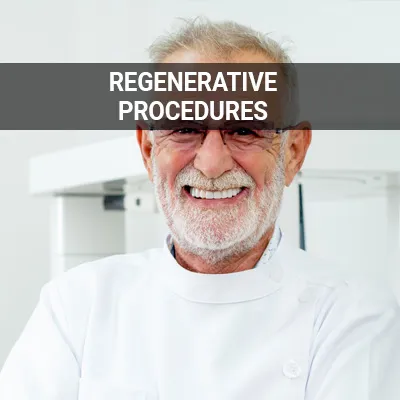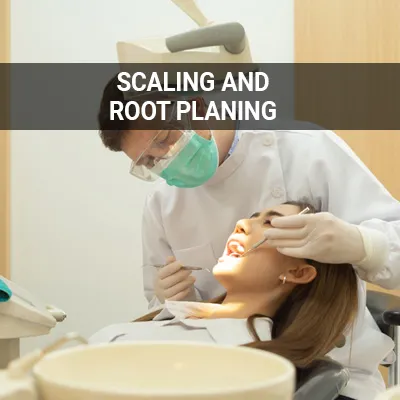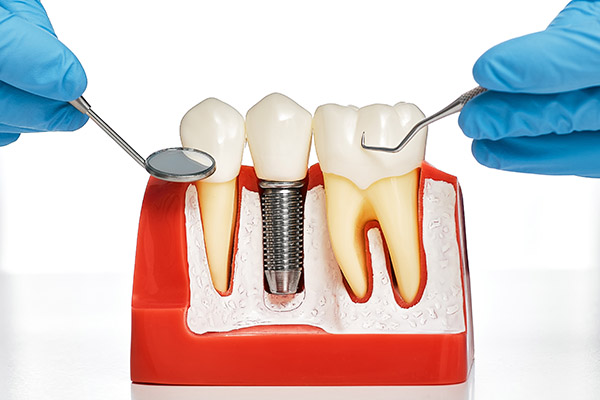Periodontics Summit, NJ
Periodontics is a dental specialty concerned with the treatment of gum-related issues and conditions with a primary focus on the prevention of periodontal disease. Periodontists help patients improve the health of their gums and surrounding tissues. Since periodontal disease is quite common, periodontics is becoming more important as a dental specialty.
Periodontics services are available at Summit Periodontics & Dental Implants and the surrounding area. For more information about how a periodontic specialist can improve the health of your gums, Summit Periodontics & Dental Implants in Summit is here to help. Call us at (908) 219-6664 to learn more or schedule an appointment.
Periodontics Basics
The term "periodontics" might sound vaguely familiar, especially since nearly half of all American adults over age 30 have some form of periodontal disease. Periodontics is an area of dentistry dedicated to the prevention, diagnosis, management, and treatment of conditions of the gums and associated tissues. Periodontal diseases can arise when the soft tissues that support the teeth become infected or inflamed, often from bacteria. Periodontists manage a range of periodontal diseases, from milder forms (such as gingivitis) to severe forms, in which the gums recede and loosen the teeth.
Periodontics is a subfield of dentistry. Every periodontist has first gone through dental school and then undertaken specific, additional training to become a periodontist. The American Academy of Periodontology notes that a periodontist typically receives three additional years of education after dental school to subspecialize.
“Periodontics is an area of dentistry dedicated to the prevention, diagnosis, management, and treatment of conditions of the gums and associated tissues.”
Types of Periodontal Procedures
A periodontist is specifically trained to identify and improve conditions related to the health of the gums and their surrounding structures. In doing this, they may conduct a variety of procedures.
Types of periodontal procedures include:
- Scaling and Root Planing: In this procedure, a periodontist cleans the infected surface of a tooth root by removing all the plaque.
- Root Surface Debridement: In a root surface debridement procedure, a periodontist removes the damaged tissue of a tooth root.
- Regenerative Procedures: These types of procedures can help reverse tissue loss using membranes, bone grafts, or other types of proteins that help the body produce new bone and tissue.
- Dental Implants: Periodontists can install and manage dental implants, artificial teeth installed into the jaw bone.
- Crown Lengthening: In this procedure, a periodontist can reshape the gum tissue to help improve the appearance and function of a tooth or make other procedures possible.
Periodontists also perform various other procedures, including those that can improve the cosmetic appearance of one's smile.
“In a root surface debridement procedure, a periodontist removes the damaged tissue of a tooth root.”
Conditions Treated in Periodontics
A periodontist aims to identify and treat specific oral conditions involving the gums and tissues.
A periodontist treats the following conditions, among others:
- Gingivitis
- Periodontitis
- Aggressive periodontitis
- Chronic periodontitis
- Periodontitis associated with systemic diseases
- Necrotizing periodontal diseases
Dentists learn about periodontal disease in dental school and can identify and begin managing periodontal conditions. However, when it comes to many conditions involving the gums, treatment by a specialist is required for maximal healing and improvement. In addition, periodontists can conduct procedures that are beyond the scope of a general dentist. These specialized interventions can dramatically restore and improve the health of the gums.
“Periodontists can conduct procedures that are beyond the scope of a general dentist.”
Check out what others are saying about our dental services on Yelp: Periodontics in Summit, NJ
Difference Between a Dentist and a Periodontist
General dentists and periodontists are both able to identify and manage conditions of the gums and associated structures. That is because a general dentist and a periodontist have gone to dental school and received training about periodontal disease. However, a periodontist has received an additional three years of training after dental school that helps them expertly manage the conditions of the gum. The extensive training and the continued education that follows their training help periodontists stay up to date with the latest information regarding gum disease and its management.
During their additional training, periodontists learn specific procedures to help them treat gum disease. These procedures are both surgical and nonsurgical and can improve the health and function of the gums and surrounding structures. Some periodontic procedures improve the cosmetic appearance of one's smile, as well. Unfortunately, general dentists do not receive this specific training, though some may undertake courses on their own if they have a special interest in gum disease.
“During their additional training, periodontists learn specific procedures to help them treat gum disease.”
Questions Answered on This Page
Q. What sort of conditions does periodontics cover?
Q. What kind of procedures does a periodontist perform?
Q. What kinds of diseases does a periodontist treat?
Q. What is the difference between a dentist and a periodontist?
People Also Ask
Q. What health conditions affect the gums?
Q. What are the benefits of a root surface debridement?
Q. What does the scaling and root planing process entail?
Q. What are the benefits of undergoing a regenerative procedure?
Q. What is preventative care in dentistry? What is preventative care in periodontics?
Frequently Asked Questions
Q. How common is periodontal disease?
A. Periodontal disease is very common. The U.S. Centers for Disease Control and Prevention (CDC) estimates that 47.2% of adults older than 30 have periodontal disease. This estimate includes the mildest form, which is gingivitis.
Q. What causes periodontal disease?
A. The most common cause of periodontal disease is a bacterial infection of the gums, teeth, and surrounding structures. That can result from poor oral hygiene practices or other conditions that decrease the health of the gums, such as smoking.
Q. Who is most likely to get periodontal disease?
A. The risk of getting periodontal disease increases with age. The CDC notes that this condition affects 70.1% of adults aged 65 years and older. In addition, men are more likely than women to be affected, those living beneath the federal poverty line, those who smoke, and those with less than high school education.
Q. What are the signs of periodontal disease?
A. Periodontal disease occurs from inflammation of the gums. This inflammation can cause bad breath, swollen or red-colored gums, gums that are tender or bleed, and pain with chewing. Periodontal disease can also affect the teeth, causing them to become loose, be sensitive, or fit together differently when you bite down.
Q. What is the order of severity in periodontal disease?
A. Periodontal disease does not commonly occur suddenly or on its own. Generally, the disease starts off as gingivitis, then gum disease, then mild to moderate to severe periodontal disease. When gum disease goes untreated, the disease worsens and may be irreversible. It is important to get treated as soon as early symptoms start and continue seeking dental care.
Start Feeling Better – Visit Us Today
By visiting us as soon as possible, our team can help get you the professional treatment you need. Instead of waiting around and allowing the symptoms to get worse, we can provide you with treatment options.
Definitions
Call Us Today to Learn More
If you are interested in having a periodontal evaluation, call as at 908-219-6664 to find out which option may be right for you.
Helpful Related Links
- American Academy of Periodontology (AAP). American Academy of Periodontology (AAP). 2023
- Center for Disease Control and Prevention (CDC), Periodontal Disease Page. Center for Disease Control and Prevention (CDC), Periodontal Disease Page. 2023
- WebMD, What Is a Periodontist?. WebMD, What Is a Periodontist?. 2023
About our business and website security
- Summit Periodontics & Dental Implants was established in 2015.
- We accept the following payment methods: American Express, Cash, Check, Discover, MasterCard, and Visa
- We serve patients from the following counties: Union County, Morris County and Essex County
- We serve patients from the following cities: Summit, Chatham, New Providence, Springfield Township, Maplewood, Berkeley Heights, Madison, Westfield, Millburn and Short Hills
- Norton Safe Web. View Details
- Trend Micro Site Safety Center. View Details
Back to top of Periodontics
